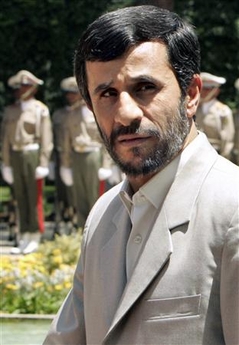Iran defied international calls for an early reply to an offer of incentives
aimed at ending a nuclear stand-off, insisting on Thursday it would use a key
July 11 meeting merely to raise questions on the package.
The European Union is due to hold preliminary talks with Iran on Thursday and
more detailed discussions next Tuesday in which it expects a formal response to
a package of technology, trade and other incentives to halt uranium enrichment.
|

Iranian President
Mahmoud Ahmadinejad walks with his Armenian counterpart Robert Kocharian
(not pictured) during an official meeting in Tehran July 5, 2006.
[Reuters]
|
"The Tuesday meeting is just for removing ambiguities. Iran will not give its
definitive answer at this meeting," an Iranian official, who requested
anonymity, told Reuters.
Major powers have said they want a reply from Tehran by a July 15 Group of
Eight summit in St. Petersburg at the latest. Tehran insists it will not give
its answer before August 22.
Iran postponed talks with EU foreign policy chief Javier Solana in Brussels
on Wednesday in apparent anger at an exiled opposition leader's visit to the
European parliament.
But Iran said its chief nuclear negotiator Ali Larijani would meet Solana for
a private dinner on Thursday.
"What we are looking for (on Thursday) is the first feedback -- the start of
the process of getting a reply," an EU diplomat said of the Thursday meeting.
"The more they (the Iranians) wait, the more the countries who made the offer
will feel impatient," said the diplomat, who requested anonymity.
However, diplomats say that as Russia and China are unlikely to back any UN
sanctions against Iran at this stage, there is little pressure on Tehran to
respond either at the Brussels talks or before the G8 summit in Russia.
The United States has accused Iran of having a secret program to build
nuclear weapons. Iran denies the charge, saying its nuclear program is solely
for power generation.
"(If Iran is) trying to stall, it's not going to work," US Secretary of State
Condoleezza Rice told reporters in Washington on Wednesday.
Iran says it sees ambiguities in the package of incentives put forward on
June 6 by the five permanent, veto-wielding UN Security Council members -- the
United States, Britain, France, Russia and China -- plus Germany.
The major powers have offered a state-of-the-art nuclear reactor with a
guaranteed fuel supply, economic benefits and support for the idea of a regional
security framework if Iran halts uranium enrichment.